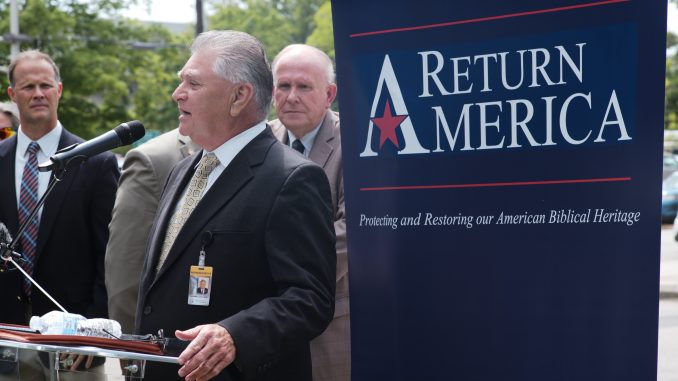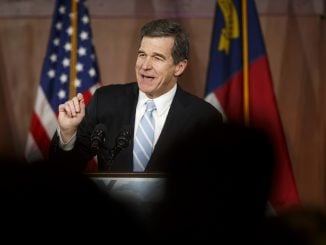
RALEIGH — Thanks to a federal court ruling, over this past weekend churches across North Carolina held indoor services for the first time since Gov. Roy Cooper imposed a stay-at-home order on the state, which included restricting gatherings to 10 people or fewer.
U.S. District Court Judge James C. Dever heard arguments on Friday, May 15 from plaintiffs challenging Cooper’s authority to restrict religious activities. The plaintiffs, a group of pastors and churches, alleged Cooper’s orders violate the U.S. and N.C. constitutions with regard to religious worship. The following day, Dever granted a temporary restraining order preventing the enforcement of Cooper’s orders restricting worship
“There is no pandemic exception to the Constitution of the United States or the Free Exercise Clause of the First Amendment,” said Dever in his ruling.
Dever delivered a stark criticism in the order, stating that “The Governor appears to trust citizens to perform non-religious activities indoors (such as shopping or working or selling merchandise) but does not trust them to do the same when they worship indoors together.”
There are “glaring inconsistencies between the treatment of religious entities and individuals,” Dever said. He noted that the legal counsel for the governor admitted as much during oral arguments that there “is no public health rationale” for allowing 50 people inside at a funeral, but only 10 people inside for church services.
While he had no doubt that Gov. Cooper desired to protect North Carolinians, the judge said that it did “not make a difference that faith-based bigotry did not motivate” the governor’s actions.
“We are very appreciative that the judge has ruled that our First Amendment rights are in place again,” said one of the plaintiffs, Dr. Ron Baity, president of the board of Return America. “We were concerned when they were literally taken from us.”
Cooper responded through a spokesperson on the same day the temporary restraining order was issued. The governor said he disagreed with ruling but would not seek to appeal the decision.
“We don’t want indoor meetings to become hotspots for the virus and our health experts continue to warn that large groups sitting together inside for long periods of time are much more likely to cause the spread of COVID-19,” said Ford Porter, a spokesperson for the governor. “While our office disagrees with the decision, we will not appeal, but instead urge houses of worship and their leaders to voluntarily follow public health guidance to keep their members safe.”
Other lawmakers and leaders applauded the court’s decision.
“Today’s decision is a victory for the Constitutional guarantee to freedom of worship,” said Sen. Warren Daniel (R-Burke), co-chairman of the Senate Judiciary Committee, in a press release. “Gov. Cooper cannot treat retailers and ABC stores one way and houses of worship another. Nor can he allow one type of worship service to proceed while prohibiting another. Hopefully, this decision will put some guardrails on what has been unchecked executive power.”
“Gov. Cooper’s targeting of North Carolinians of faith, foot-dragging in reopening our state, and utter dismantling of our economy has made his response to the coronavirus among the most extreme in the entire country,” said Republican Congressman Dan Bishop who represents the Ninth District. “Today’s ruling confirmed it’s even worse than that — an unlawful trampling of our constitutional right to exercise our faith in God.”
The order by Dever has opened up the possibility of suits against the governor’s orders by other businesses and groups in North Carolina. At least one such suit already seems to be in the works.
Attorneys from the firm of Kitchen and Turrentine PLLC in Raleigh are representing the Hair is Essential Association, which sent a letter to Cooper’s office last week.
“People have the inalienable right to earn a living. Neither you, nor the state, have the right to preclude citizens using their own means from pursuing their own vocation,” said the letter.
The legal firm says that the governor’s executive orders violate the “Fruits of their labor clause” in the state’s constitution. Their client’s spokeswoman, Adele Ange, said they believe it was unconstitutional for Cooper to have closed salons in the first place.
The Hair is Essential Association has set up a GoFundMe account to help with estimated legal and court fees associated with fighting the governor’s order. The group has raised over $9,000 so far.
Underscoring the group’s argument is state statute dealing with the additional powers that can be granted to the governor during a state of emergency that require “concurrence of the Council of State.” The letter sent by Kitchen and Turrentine says that Cooper overstepped his legal authority since his orders were “issued in violation of N.C. General Statute § 166A-19.30(b).” At the time Cooper issued his order shutting down restaurants and bars in March, emails provided by the lieutenant governor’s office show that Cooper failed to obtain concurrence from the Council of State.
The letter demanded that the state allow salons to open by noon this past Monday, May 18, or face a lawsuit. Attorney Chuck Kitchen told NSJ that he will wait to see if Cooper will announce a move to Phase Two before formally filing the lawsuit.



